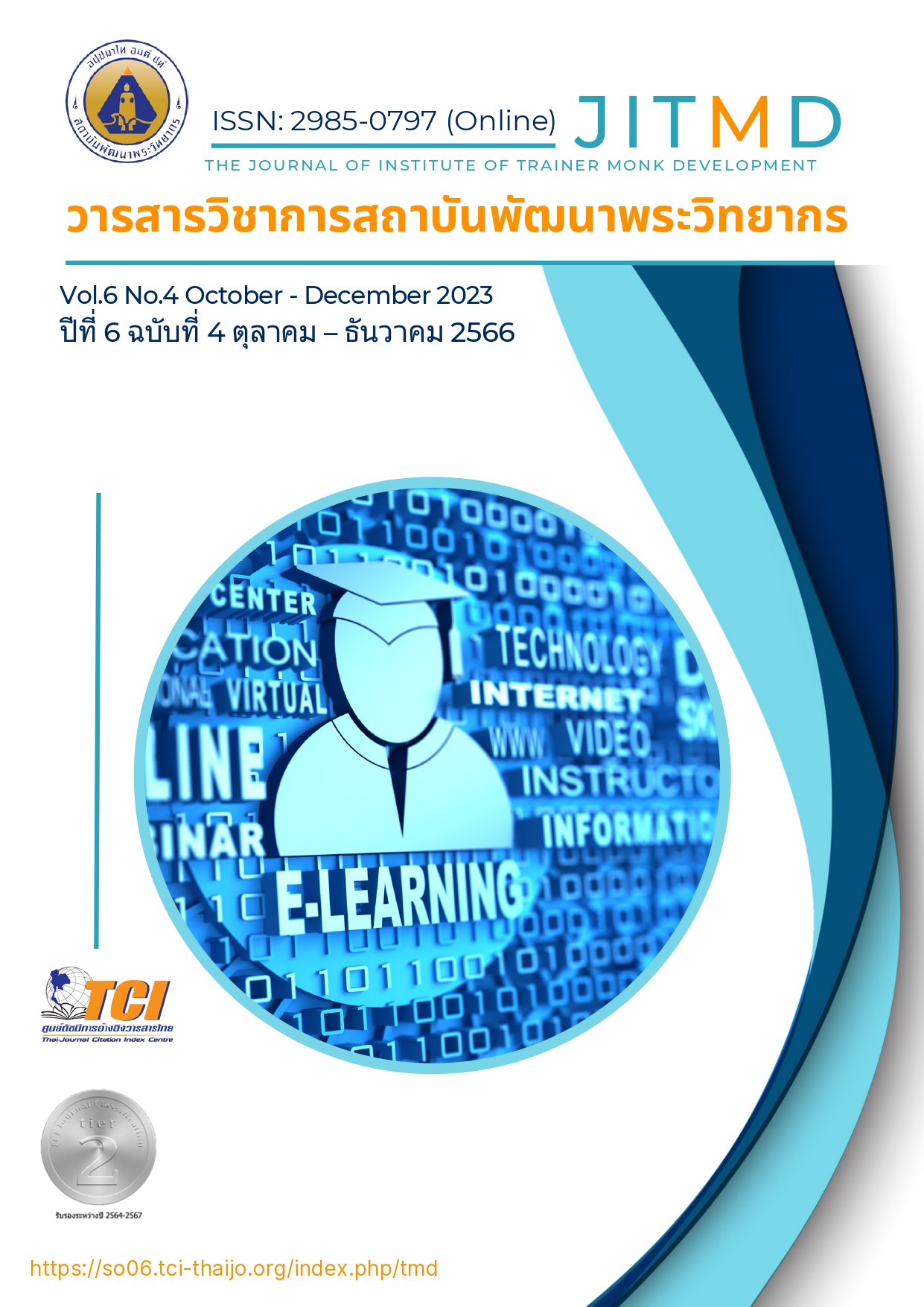Guidelines for Learning Management about the 4 Noble Truths for Early Childhood
Main Article Content
Abstract
The objective of this research article is to present the guidelines on learning management about the Four Noble Truths for early childhood. The Four Noble Truths consist of Dukkha; the truth of suffering or uneasiness, Samudaya; the cause of suffering, Nirodha; the cessation of suffering, and Magga; the Noble Eightfold Path to the cessation of suffering. These Four Noble Truths are important teachings in Buddhism. They are valuable substances that should be instilled in Buddhists from an early age. In this article, the author has studied, researched, analyzed and synthesized the Four Noble Truths together with educational concepts and theories. This is to obtain guidelines on learning management about the Four Noble Truths which correspond to the physical, emotional, social, mental and intellectual development of early childhood. The author has presented examples of the language use and simple words to explain the meaning of the dharmic principle to suit the children language development. The author has also presented examples of simple activities that early childhood education teachers will be able to put into practice and create a foundation of understanding of the Four Noble Truths to early childhood.
Article Details

This work is licensed under a Creative Commons Attribution-NonCommercial-NoDerivatives 4.0 International License.
บทความที่ได้รับการตีพิมพ์เป็นลิขสิทธิ์ของวารสารวิชาการสถาบันพัฒนาพระวิทยากร
ข้อความที่ปรากฎอยู่ในบทความที่ได้รับการตีพิมพ์ในวารสาร ถือเป็นความรับผิดชอบของผู้เขียนบทความ และข้อคิดเห็นนั้นไม่ถือว่าเป็นทัศนะและความรับผิดชอบของกองบรรณาธิการวารสารวิชาการสถาบันพัฒนาพระวิทยากร
References
กนกวรรณ ขวัญอ่อน. (2562). การสร้างความเข้มแข็งทางด้านจิตใจตามหลักพระพุทธศาสนา. วารสารวิชาการสถาบันพัฒนาพระวิทยากร, 2(1), หน้า 46-59.
ทิศนา แขมมณี. (2566). ศาสตร์การสอน: องค์ความรู้เพื่อการจัดกระบวนการเรียนรู้ที่มีประสิทธิภาพ. กรุงเทพฯ: สำนักพิมพ์จุฬาลงกรณ์มหาวิทยาลัย.
มหาจุฬาลงกรณราชวิทยาลัย. (2539). พระไตรปิฎกภาษาไทย ฉบับมหาจุฬาลงกรณราชวิทยาลัย. กรุงเทพมหานคร: โรงพิมพ์มหาจุฬาลงกรณราชวิทยาลัย.
พระครูปลัดศักดิ์ มหาวีโร (โกศลสุภวัฒน์). (2563). “รูปแบบการจัดการเรียนการสอนตามหลักอริยสัจ 4 สำหรับนักเรียนประถมศึกษาในโรงเรียนสังกัดกรุงเทพมหานคร”. ดุษฎีนิพนธ์ตามหลักสูตรพุทธศาสตรดุษฎีบัณฑิต สาขาวิชาพุทธบริหารการศึกษา. บัณฑิตวิทยาลัย: มหาวิทยาลัยมหาจุฬาลงกรณราชวิทยาลัย.
พระภาวนาวิริยคุณ (หลวงพ่อทัตตชีโว). (2556). นักโทษแห่งวัฏสงสาร ตอนที่ 3 อริยสัจ 4 (พระธรรมเทศนา เมื่อวันที่ 1 ธันวาคม พ.ศ. 2554). วารสารอยู่ในบุญ. 11(129): 62-65.
พระภาวนาวิริยคุณ (หลวงพ่อทัตตชีโว). (2556). นักโทษแห่งวัฏสงสาร ตอนที่ 4 อริยสัจ 4 (พระธรรมเทศนา เมื่อวันที่ 1 ธันวาคม พ.ศ. 2554). วารสารอยู่ในบุญ. 11(130): 66-69.
พระอนันตชัย อภินนฺโท (ขันโพธิ์น้อย). (2560). ความทุกข์ในอริยสัจ 4. วารสารพุทธจิตวิทยา. 2(2): 45-58.
พระอำนาจ จิตตฺทนฺโต (เสมอทรัพย์). (2562). “การศึกษาเปรียบเทียบปฐมเทศนาในพระพุทธศาสนาเถรวาทกับเทศนาบนภูเขาในคริสต์ศาสนา”. วิทยานิพนธ์ปริญญาพุทธศาสตรมหาบัณฑิต สาขาวิชาศาสนาเปรียบเทียบ. บัณฑิตวิทยาลัย: มหาวิทยาลัยมหาจุฬาลงกรณราชวิทยาลัย.
สาโรช บัวศรี. (2553). รำลึกคุณูปการ ศาสตราจารย์ ดร.สาโรช บัวศรี. สถาบันวัฒนธรรมและศิลปะ มหาวิทยาลัยศรีนครินทรวิโรฒ: สันติศิริการพิมพ์.
สำนักวิชาการและมาตรฐานการศึกษา สำนักงานคณะกรรมการการศึกษาขั้นพื้นฐาน กระทรวงศึกษาธิการ. (2561). คู่มือหลักสูตรการศึกษาปฐมวัย พุทธศักราช 2560 สำหรับเด็กอายุ 3-6 ปี. (พิมพ์ครั้งที่ 1). กรุงเทพฯ: โรงพิมพ์ชุมนุมสหกรณ์การเกษตรแห่งประเทศไทย.
Jean Piaget. (1950). The Psychology of Intelligence. New York: Harcourt, Brace and World.
Milton V Uecker. (2019). Distinctively Christian: A Christ-centered Approach to Early Childhood Spiritual Development. US: Wheaton Press.


